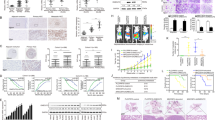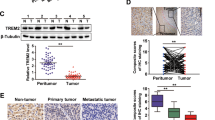Abstract
The molecular mechanism underlying metastasis of hepatocellular carcinoma (HCC) remains elusive. Here, we showed that matrix metalloproteinase (MMP) 7 and MMP26 levels are significantly higher in the resected HCC than in the adjacent healthy hepatic cells from the patients. Moreover, a strong correlation of the levels of MMP7 or MMP26 with the phosphorylated fibroblast growth factor receptor 2 (FGFR2) was detected. To prove a causal link between the activation of FGFR signaling pathway and expression of MMP7 and MMP26, we used two human HCC lines, HepG2 and HuH-7, to study the underlying molecular basis. We found that FGF1-induced FGFR2 phosphorylation in either line resulted in significant activation of MMP7 and MMP26 and consequently an increase in cancer invasiveness. Inhibition of FGFR2 phosphorylation in HCC abolished FGF1-stimulated MMP7 and MMP26 expression, suggesting that activation of the FGFR signaling pathway in HCC may promote cancer metastasis by inducing MMP7 and MMP26 expression. To define the signal transduction cascades downstream of FGFR2 activation for MMP7 and MMP26 activation, we applied specific inhibitors for phosphatidylinositol-3 kinase (PI3K), extracellular signal-related kinase/mitogen-activated protein kinase (ERK/MAPK), and Jun N-terminal kinase (JNK), respectively, to the FGF1-stimulated HCC cells. We found that only inhibition of JNK significantly decreased the activation of MMP26 in response to FGF1 stimulation, and only inhibition of PI3K significantly decreased the activation of MMP7 in response to FGF1 stimulation, suggesting that the activation of the FGFR2 signaling may activate PI3K to activate MMP7 and activate JNK to activate MMP26, in HCC. Our study thus highlights the FGFR2 signaling pathway and MMP7 and MMP26 as novel therapeutic targets for HCC.





Similar content being viewed by others
References
Wang L, Yao M, Dong Z, Zhang Y, Yao D. Circulating specific biomarkers in diagnosis of hepatocellular carcinoma and its metastasis monitoring. Tumour Biol. 2014;35:9–20.
Wang H, Chen L. Tumor microenviroment and hepatocellular carcinoma metastasis. J Gastroenterol Hepatol. 2013;28 Suppl 1:43–8.
Han MS, Moon KS, Lee KH, Cho SB, Lim SH, Jang WY, et al. Brain metastasis from hepatocellular carcinoma: the role of surgery as a prognostic factor. BMC Cancer. 2013;13:567.
Takaishi H, Kimura T, Dalal S, Okada Y, D’Armiento J. Joint diseases and matrix metalloproteinases: a role for mmp-13. Curr Pharm Biotechnol. 2008;9:47–54.
Vincenti MP, Brinckerhoff CE. Transcriptional regulation of collagenase (mmp-1, mmp-13) genes in arthritis: integration of complex signaling pathways for the recruitment of gene-specific transcription factors. Arthritis Res. 2002;4:157–64.
Balbin M, Pendas AM, Uria JA, Jimenez MG, Freije JP, Lopez-Otin C. Expression and regulation of collagenase-3 (mmp-13) in human malignant tumors. APMIS. 1999;107:45–53.
Tanimoto H, Underwood LJ, Shigemasa K, Parmley TH, Wang Y, Yan Y, et al. The matrix metalloprotease pump-1 (mmp-7, matrilysin): a candidate marker/target for ovarian cancer detection and treatment. Tumour Biol. 1999;20:88–98.
Koskensalo S, Mrena J, Wiksten JP, Nordling S, Kokkola A, Hagstrom J, et al. Mmp-7 overexpression is an independent prognostic marker in gastric cancer. Tumour Biol. 2010;31:149–55.
Koskensalo S, Louhimo J, Nordling S, Hagstrom J, Haglund C. Mmp-7 as a prognostic marker in colorectal cancer. Tumour Biol. 2011;32:259–64.
Ii M, Yamamoto H, Adachi Y, Maruyama Y, Shinomura Y. Role of matrix metalloproteinase-7 (matrilysin) in human cancer invasion, apoptosis, growth, and angiogenesis. Exp Biol Med (Maywood). 2006;231:20–7.
Liu G, Jiang C, Li D, Wang R, Wang W. Mirna-34a inhibits egfr-signaling-dependent mmp7 activation in gastric cancer. Tumour Biol. 2014.
Zhang Y, Zhao H, Wang Y, Lin Y, Tan Y, Fang X, et al. Non-small cell lung cancer invasion and metastasis promoted by mmp-26. Mol Med Rep. 2011;4:1201–9.
Li D. Peaking of mmp-26 and timp-4 marks invasive transition in prostate cancer. Cell Res. 2006;16:741.
Yamamoto H, Vinitketkumnuen A, Adachi Y, Taniguchi H, Hirata T, Miyamoto N, et al. Association of matrilysin-2 (mmp-26) expression with tumor progression and activation of mmp-9 in esophageal squamous cell carcinoma. Carcinogenesis. 2004;25:2353–60.
Friesel R, Maciag T. Fibroblast growth factor prototype release and fibroblast growth factor receptor signaling. Thromb Haemost. 1999;82:748–54.
Jaye M, Schlessinger J, Dionne CA. Fibroblast growth factor receptor tyrosine kinases: molecular analysis and signal transduction. Biochim Biophys Acta. 1992;1135:185–99.
Wang X, Cao X. Regulation of metastasis of pediatric multiple myeloma by mmp13. Tumour Biol. 2014.
Fujimoto J, Hori M, Ichigo S, Tamaya T. Expressions of the fibroblast growth factor family (fgf-1, −2 and −4) mrna in endometrial cancers. Tumour Biol. 1996;17:226–33.
Soundararajan P, Fawcett JP, Rafuse VF. Guidance of postural motoneurons requires mapk/erk signaling downstream of fibroblast growth factor receptor 1. J Neurosci. 2010;30:6595–606.
Kuslak SL, Marker PC. Fibroblast growth factor receptor signaling through mek-erk is required for prostate bud induction. Differentiation. 2007;75:638–51.
Williamson AJ, Dibling BC, Boyne JR, Selby P, Burchill SA. Basic fibroblast growth factor-induced cell death is effected through sustained activation of p38mapk and up-regulation of the death receptor p75ntr. J Biol Chem. 2004;279:47912–28.
Kan M, Wu X, Wang F, McKeehan WL. Specificity for fibroblast growth factors determined by heparan sulfate in a binary complex with the receptor kinase. J Biol Chem. 1999;274:15947–52.
Fletcher MN, Castro MA, Wang X, de Santiago I, O’Reilly M, Chin SF, et al. Master regulators of fgfr2 signalling and breast cancer risk. Nat Commun. 2013;4:2464.
Liao RG, Jung J, Tchaicha J, Wilkerson MD, Sivachenko A, Beauchamp EM, et al. Inhibitor-sensitive fgfr2 and fgfr3 mutations in lung squamous cell carcinoma. Cancer Res. 2013;73:5195–205.
Kang M, Choi S, Jeong SJ, Lee SA, Kwak TK, Kim H, et al. Cross-talk between tgfbeta1 and egfr signalling pathways induces tm4sf5 expression and epithelial-mesenchymal transition. Biochem J. 2012;443:691–700.
Xiao X, Gaffar I, Guo P, Wiersch J, Fischbach S, Peirish L, et al. M2 macrophages promote beta-cell proliferation by up-regulation of smad7. Proc Natl Acad Sci U S A. 2014;111:E1211–20.
Xu Y, Xia W, Baker D, Zhou J, Cha HC, Voorhees JJ, et al. Receptor-type protein tyrosine phosphatase beta (rptp-beta) directly dephosphorylates and regulates hepatocyte growth factor receptor (hgfr/met) function. J Biol Chem. 2011;286:15980–8.
Conflicts of interest
None
Author information
Authors and Affiliations
Corresponding author
Additional information
The Publisher and Editor retract this article in accordance with the recommendations of the Committee on Publication Ethics (COPE). After a thorough investigation we have strong reason to believe that the peer review process was compromised.
An erratum to this article can be found online at http://dx.doi.org/10.1007/s13277-017-5487-6.
About this article
Cite this article
Wang, J., Su, H., Han, X. et al. RETRACTED ARTICLE: Inhibition of fibroblast growth factor receptor signaling impairs metastasis of hepatocellular carcinoma. Tumor Biol. 35, 11005–11011 (2014). https://doi.org/10.1007/s13277-014-2384-0
Received:
Accepted:
Published:
Issue Date:
DOI: https://doi.org/10.1007/s13277-014-2384-0




